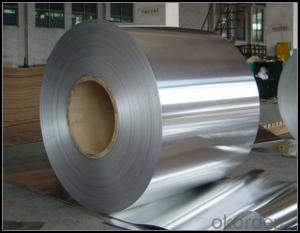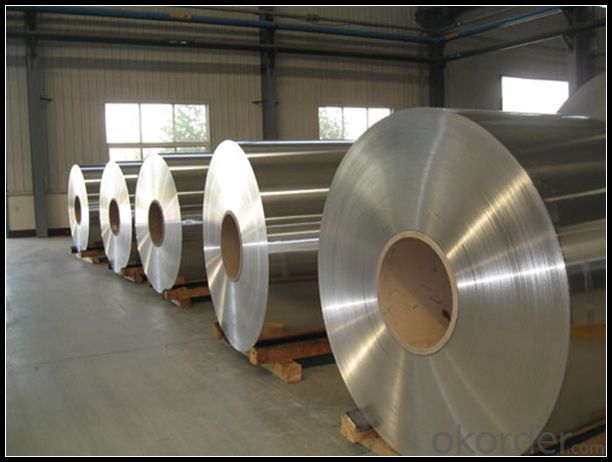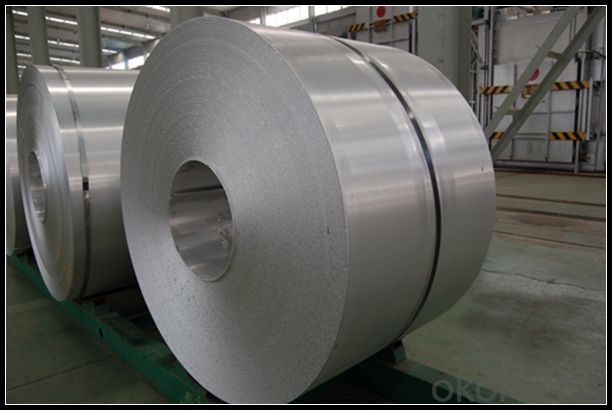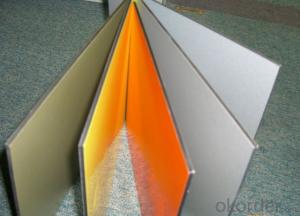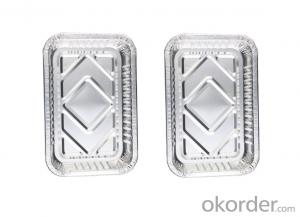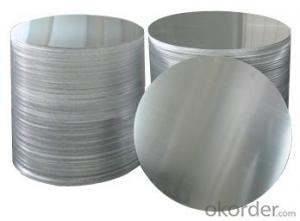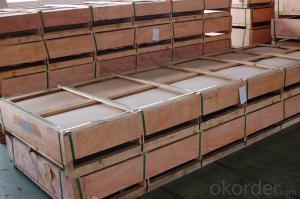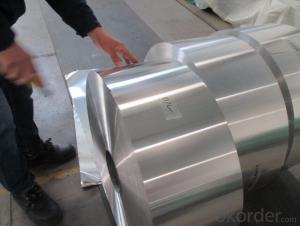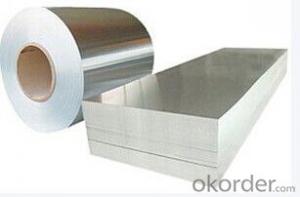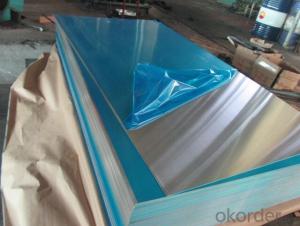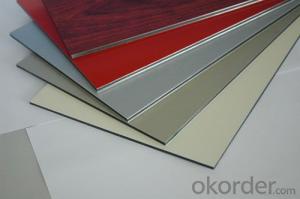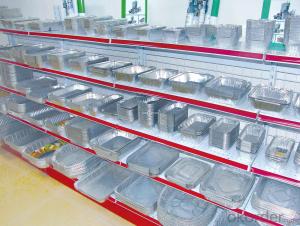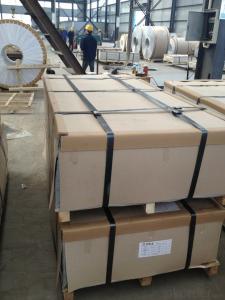Disposable Aluminum Baking Sheets - Various Thickness Different Size Aluminium Coil 3105 H16
- Loading Port:
- Shanghai
- Payment Terms:
- TT OR LC
- Min Order Qty:
- 5 m.t.
- Supply Capability:
- 1999 m.t./month
OKorder Service Pledge
OKorder Financial Service
You Might Also Like
Specification
1) Alloy | 1050, 1060,1100, 3003 3004 3105 3005 5005 5052 etc |
2) Temper | O/H12/H14/H1/H18/H32/H34/H36/H38//H111/H112/H116/H321/T6/T651/T3/T351 etc |
3) Thickness | 0.1mm to 6mm |
4) Width | 20mm to 3300mm |
5) Coil weight | 100kgs to 6 tons depends on actual requirement |
6) Core material | Aluminum alloy |
7) Coil Inner diameter | 76mm, 152mm,or as required |
2. Application of Aluminum
(1).Interior: wall cladding, ceilings, bathrooms, kitchens and balconies, shutters, doors...
(2).Exterior: wall cladding, facades, roofing, canopies, tunnels,column covers , renovations...
(3).Advertisement: display platforms, signboards, fascia, shop fronts...
3. Feature of Aluminum
1100-H14-DIAMOND EMBOSSED ALUMINUM SHEET
Thickness:1.2mm---4mm,
width:1000mm---1500mm
Product code: 618 a - 33 y titanium matte aluminum plate
Technical parameters
Aluminum alloy/material: 1100
Tensile strength N/was: 115-125
The yield strength of N/was: 150-150
Elongation % : 3 or more
Rainbow degrees: no
Process: light oxidation process
Product description: surface "colored metal silken face" as the main characteristics of the product, completely metal texture, color variety, products can be mild tensile and bending.
Product use: can be used to directly shape stamping, screen printing, thermal transfer two composite process, etc.Used in architectural decoration, household appliances, switch panel, auto parts, lamps lighting, electronic hardware and other industries.
Supply scope of coil or sheet
Mm thickness specification: 0.4 1
Maximum width mm: 1250
The tolerance range
Mm thickness: 0.02 mm
The width of the mm: 2 -
Mm length: 2 -
Actual weight kg: plus or minus 2
Protective film
Protective film on the surface of the aluminum quality assurance period for six months, aluminum is kept dry and ventilated, avoid heat and direct sunlight.If the aluminium material stored in high temperature or direct sunlight can cause protective film, or unable to tear in addition to wait for a phenomenon.
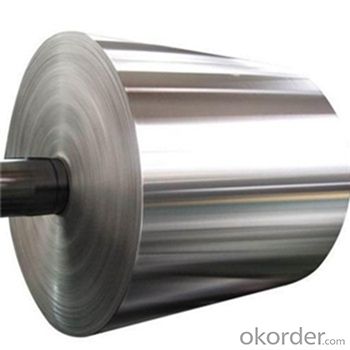
4. Certificate:
SGS and ROHS(if client request, paid by client), MTC(plant provided), Certificate of Origin(FORM A, FORM E, CO), Bureau Veritas and SGS (if client request, paid by client), CIQS certificate
5. Image of Aluminum
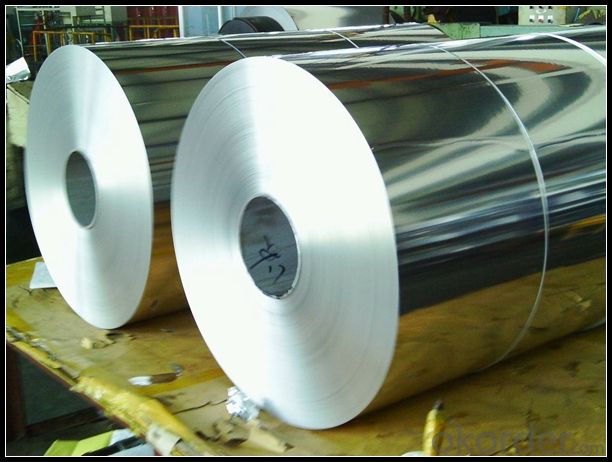
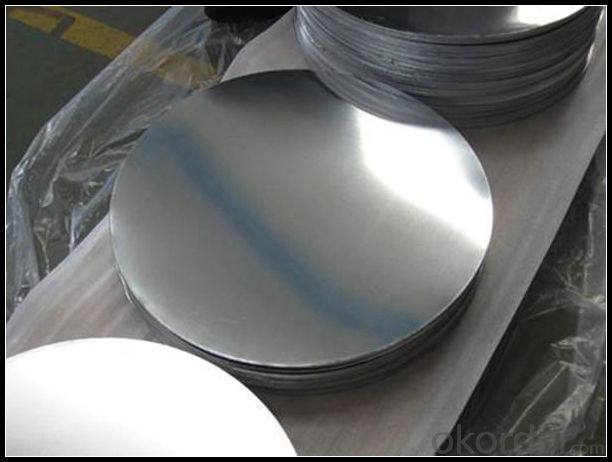
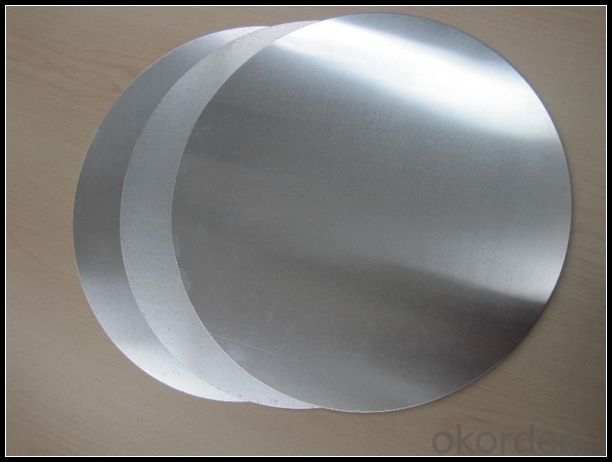
6. Our Service
1. Reply your enquiry in 24 working hours. |
2. OEM, buyer design, buyer label services provided. |
3. Exclusive and unique solution can be provide to our customer by our well traned and professional engineers and staffs. |
4. We can provide free sample for your check |
5. We have the certification of ISO 9001 |
6. Timely delivery |
7. Special discount and protection of sales area provided to our distributor. |
8. Good after-sale service. |
7. FAQ
Q: What is the produce prase? |
A: Normally it would be 40days after received your deposit. |
Q: Can you provide free samples? |
A: Yes, free samples will be sent to you on freight at destination. |
Q: Can I get your latest catalogue? |
A: Yes, it will be sent to you in no time. |
Q: What is the MOQ? |
A: 3 tons |
Q: What are your payment terms? |
A: We accept L/C, D/A, D/P, T/T, West Union,etc. |
- Q: Where is the difference between the 5052 aluminum plate and the 1060 Aluminum plate?
- 5052 is aluminium magnesium alloy, 1060 is pure aluminium
- Q: Are the aluminum sheets suitable for manufacturing electrical enclosures?
- Indeed, aluminum sheets prove to be a suitable material for the production of electrical enclosures. Within the manufacturing industry, aluminum is widely utilized due to its versatility and numerous advantages. To begin with, aluminum possesses a unique combination of lightweight properties and strength, making it an ideal choice for constructing enclosures that require durability without the burden of excessive weight. Its strength-to-weight ratio surpasses that of many other metals, allowing for the creation of sturdy enclosures without unnecessary bulkiness. Moreover, aluminum exhibits exceptional resistance to corrosion, a crucial attribute for electrical enclosures that may encounter various environmental conditions, such as moisture, humidity, or corrosive elements. The natural oxide layer present on aluminum acts as a protective barrier, ensuring the enclosures' longevity and reliability. Additionally, aluminum possesses excellent electrical conductivity, a vital characteristic for electrical enclosures. This property facilitates efficient dissipation of heat generated by electrical components, effectively preventing overheating and potential damage to the enclosed devices. Furthermore, aluminum is highly machinable and can be easily molded into different shapes and sizes. This inherent flexibility enables manufacturers to customize the enclosures according to specific requirements, ensuring a perfect fit for the intended electrical components. Finally, when considering cost-effectiveness, aluminum proves to be a more economical choice compared to other metals such as stainless steel or copper. It strikes a balance between affordability and performance, making it an attractive option for the manufacturing of electrical enclosures. In conclusion, the lightweight nature, strength, corrosion resistance, electrical conductivity, machinability, and cost-effectiveness of aluminum sheets make them a highly suitable material for the production of electrical enclosures.
- Q: Are aluminum sheets resistant to saltwater corrosion?
- Yes, aluminum sheets are generally resistant to saltwater corrosion. Aluminum has a natural ability to form a protective oxide layer when exposed to air or water, including saltwater. This oxide layer acts as a barrier, preventing further corrosion and protecting the underlying metal. Additionally, aluminum is lightweight and durable, making it a popular choice for various marine applications such as boats, shipbuilding, and offshore structures. However, it is important to note that the resistance to saltwater corrosion can vary depending on the specific alloy and surface treatment of the aluminum sheets. Therefore, proper selection of the appropriate alloy and protective coatings can further enhance the corrosion resistance of aluminum sheets in saltwater environments.
- Q: How could two pieces of aluminium flakes be welded together?
- its welding strength is very high. you can use the following methods to weld two pieces of aluminum sheets together: 1, strict deformation control requirement. 3, it can prevent some flux remnant during welding. 3,the welding wire welding of low temperature M51 and M51-F is operated under 179?C.or they are welded in the situation of being especially thin.4, it can solve the welding of 3 series aluminium alloys and casting, and its welding temperature is 380-400?C.its advantage is that you don't need any flux during welding. WE53 low temperature aluminium welding wire has a high affinity in welding 7 series aluminium alloys. and Q303 low temperature aluminum welding wire has a high affinity for the welding of 1 series aluminium alloys, die casting or 6 series welding materials.
- Q: how to avoid oxidation of aluminum sheet after wire drawing?
- leave it alone after wire drawing!aluminum sheet will formulate a layer of dense oxide film. So you don't need to worry about it! Don't often polish the aluminum wire, or they will be more and more slimsy, the oxide film is used for avoiding reoxidation.
- Q: What's the standard thickness of aluminum sheet?
- the thickness of tobacco aluminum foil and red wine bottle cap is designed according to customers demands and manufacturer has no stated specification.
- Q: Is it suitable to use aluminum sheets in outdoor settings where they will be subjected to weather conditions?
- <p>Yes, aluminum sheets can be used for outdoor applications, even when exposed to weathering. Aluminum is a durable and corrosion-resistant material, which makes it suitable for outdoor use. It does not rust like iron or steel and can withstand various weather conditions. However, it's important to use aluminum alloys specifically designed for outdoor use, and to apply protective coatings or finishes to enhance its resistance to weathering and extend its lifespan.</p>
- Q: What is the bending radius of aluminum sheets?
- The bending radius of aluminum sheets is influenced by several factors, including the sheet thickness, the type of aluminum alloy used, and the bending method employed. In general, aluminum sheets with a thickness of 1mm or less can be bent without cracking if the radius is equal to the thickness of the sheet. For thicker aluminum sheets, it is necessary to have a bending radius that exceeds the thickness of the sheet in order to prevent cracking or fracturing. As a rule of thumb, aluminum sheets with a thickness ranging from 1mm to 6mm should have a bending radius at least 1.5 times the sheet thickness. For instance, a 3mm thick aluminum sheet should have a minimum bending radius of 4.5mm. It is important to note that these guidelines are approximate and can vary depending on the specific aluminum alloy and temper utilized. Additionally, different bending processes, such as air bending, bottoming, or coining, may require different bending radii. To obtain precise bending radius requirements for specific applications of aluminum sheets, it is advisable to consult the manufacturer's specifications or seek professional advice.
- Q: What are the common thicknesses of aluminum sheets used in aerospace applications?
- In aerospace applications, aluminum sheets are commonly used due to their lightweight and high strength properties. The thickness of aluminum sheets used in aerospace applications can vary depending on the specific requirements of the component or structure being fabricated. Commonly used thicknesses for aluminum sheets in aerospace applications range from 0.016 inches (0.4 mm) to 0.25 inches (6.35 mm). These thicknesses are selected based on factors such as the desired strength-to-weight ratio, structural integrity, and the specific application or component being manufactured. Thinner aluminum sheets, such as those with a thickness of 0.016 to 0.040 inches, are often used for lightweight structures, interior components, and non-critical parts. These thinner sheets provide the necessary strength while minimizing weight. For more structural components, thicker aluminum sheets are employed. Thicknesses between 0.040 and 0.125 inches are commonly used for structural elements like floor panels, bulkheads, and wing ribs. These sheets offer increased strength and rigidity for supporting the aircraft's weight and managing the stresses experienced during flight. In certain cases, even thicker aluminum sheets may be used, ranging from 0.125 to 0.25 inches, for heavy-duty structural components or areas where additional strength is required. These thicker sheets are utilized in critical parts such as landing gear components, wing spars, and engine mounts to ensure the necessary structural integrity and load-bearing capability. It is important to note that these are general ranges, and the specific thickness requirements may vary depending on the aircraft type, design specifications, and the particular application within the aerospace industry.
- Q: This question asks for a comparison of the cost of aluminum sheets with other building materials.
- <p>Aluminum sheets are generally considered cost-effective compared to other building materials, especially when considering their long-term benefits. They are relatively inexpensive to produce and install, and their low maintenance requirements can save costs over time. However, their initial cost may be higher than some materials like wood or vinyl. Aluminum's resistance to corrosion and weathering means it lasts longer, which can offset the higher upfront cost. In contrast, materials like steel might be more expensive due to their weight and the cost of corrosion protection, while concrete and masonry are typically more costly for both materials and labor. The cost-effectiveness of aluminum can vary based on regional prices, specific project requirements, and the type of aluminum product (e.g., thickness, finish).</p>
Send your message to us
Disposable Aluminum Baking Sheets - Various Thickness Different Size Aluminium Coil 3105 H16
- Loading Port:
- Shanghai
- Payment Terms:
- TT OR LC
- Min Order Qty:
- 5 m.t.
- Supply Capability:
- 1999 m.t./month
OKorder Service Pledge
OKorder Financial Service
Similar products
Hot products
Hot Searches
Related keywords
